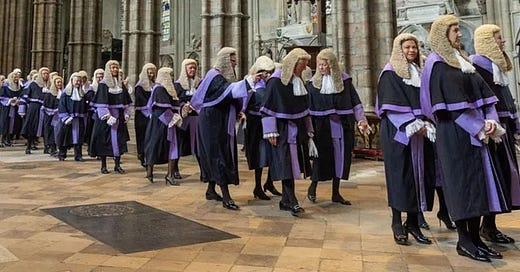The Ministry of Justice will shortly be inviting applications for honorary King’s Counsel. Last year’s announcement1 explains that the award is not a working rank and is not normally awarded to anyone eligible for a substantive appointment. It is purely an honour for those thought to have made a major contribution to the law, outside the courtroom.
That’s emphasised by officials at the Ministry of Justice when they write to those offered the status:
Avoiding confusion must be even more important when an honorary KC happens to be a circuit judge. Although KCs stop using their rank when they are made made full-time members of the High Court in England and Wales, circuit judges — who sit mainly in the Crown Court — are allowed to keep the status of KC if they have already earned it.
The official explanation for this anomaly is that a High Court judge’s letters patent supersede those of a KC. But the real reason must be that, until a few years ago, almost all High Court judges had practised as leading counsel before their appointment whereas many circuit judges had not. Those who had made it to the front row were understandably keen to keep their superior status on display when they became judges.
It follows that if you see the name of a circuit judge followed by the letters KC, you can assume that the judge earned the rank as an advocate. To adapt the Ministry of Justice advice, where there could be any risk of confusion with those who practised as King’s Counsel before appointment to the circuit bench, it would be necessary to make it clear that the title is honorary by using the form KC (hon).
But one long-serving circuit judge seems to have found it challenging to stop the qualifier falling off his post-nominals.
Keep reading with a 7-day free trial
Subscribe to A Lawyer Writes to keep reading this post and get 7 days of free access to the full post archives.





